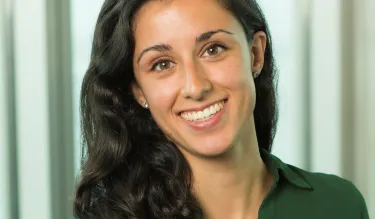Devin Kelsey, MBA ’18
“I knew I was supposed to be learning and experimenting and trying different things until Stanford started.”
July 27, 2023
The pivot that led Devin Kelsey from Stanford Graduate School of Business into his current role as deputy legislative director for a Missouri congressman began during his stint as the GSB’s student body president.
About Devin
Hometown
Springfield, Missouri
Education
MBA, Stanford Graduate School of Business (2020)
BS, Mathematics, Economics, and Statistics; BA, Political Science, University of Missouri (2014)
Professional Experience
Deputy Legislative Director (U.S. Rep. Emanuel Cleaver)
Consultant and Business Analyst, Wimmer Solutions
Manager and Co-Founder, Little Caesars pizza franchise
Current Profile
“I realized that was more about who I was — figuring out how to make a better world in tangible ways for the people who are living in it,” says the staffer for U.S. Rep. Emanuel Cleaver, a 10-term Democrat from Kansas City. “That was huge. How do I impact the community around me for the better? What problems do I see and who is doing something about those?” We asked Kelsey to discuss his experience as a deferred enrollment student, and what he learned during his deferral period and at GSB that shaped his life and career path.
Why did you decide to apply for deferred enrollment?
I was thinking about getting a PhD in economics, but I was doing a start-up at school and enjoying the people and bootstrapping elements of it. I started thinking about business school and mentioned it to a friend. I already had committed to the idea but didn’t realize you normally wait a couple of years before going to the top MBA programs. I was at a state school. I didn’t know anybody that went to places like Harvard or Stanford. I figured I’d have to wait. Then I heard about deferred enrollment.
How’d you spend your deferral time?
My family was starting Little Caesars franchises, and my dad was starting his first one that summer after I graduated from college. I packed up and moved to Florida. We got a contract for four stores, so I was helping with the launch. After six months, I realized that was the wrong choice. I ended up completely pivoting, which was helpful because I had this two-year deferral period where it felt like a nice safety net. I knew I was supposed to be learning and experimenting and trying different things to find what I love until Stanford started.
What other things did you try during this time?
Missouri was the only place I’d lived except for those six months down in southern Florida, but somebody I’d talked to in Seattle — a place I’d never been — implied that there might be a job and wanted to help me find something. I ended up meeting the CEO of Wimmer Solutions who helped me find a temporary placement before a job opened at his company. All of this only felt possible because I knew where an end point was. Throwing caution to the wind was not something my family understood, and it didn’t make 100% sense on paper, but it ended up working out for me in a beautiful way.
Would you have done anything differently?
I probably would have gone even riskier. I worried too much about what Stanford would think about the choices I made while in deferral. I remember thinking, “Will this look good or not?”
Did your career goals change once you got to GSB?
I started thinking I’d do something in entrepreneurship. But I moved away from that. Within two weeks at the GSB, I realized that wasn’t the path for me.
Explain how you pivoted from business school into a legislative career, and how your experience at GSB may have influenced that.
The GSB’s “change lives, change organizations, change the world” idea is something I really believe in. I was president of the student government there and invested a lot of my time and resources into making that community as good as it could be. It scratches the same itch that student government did. If not me, then who? It was just hard to want to do anything else.
Any classes that were particularly influential during your Stanford MBA experience?
It was a class on personal branding called Project You, co-taught by Tyra Banks and Allison Kluger. They were a fantastic team. It forced me to think about who I am in just the right way. We originally had to write and record a two-minute speech as a homework assignment about who we were. Then we had to cut it to 30 seconds. Then to 10 seconds. Then to just a few words. That process made us think about the process of deciding our priorities. It was such a simple exercise, but it’s a hierarchy of your values and needs. That helped impact the direction I went.
Any advice for others contemplating the deferred enrollment program?
It’s great to commit early. Sometimes it’s hard for people to go back to school if they’ve decided they’re done. It was nice to have the plan set in motion in undergrad while I was still in an academic environment. It’s helpful to give yourself that safety net, and not procrastinate year after year.
Explore More Stories
Pulkit Agarwal, MBA ’20

Supriya Hobbs, MBA ’18
